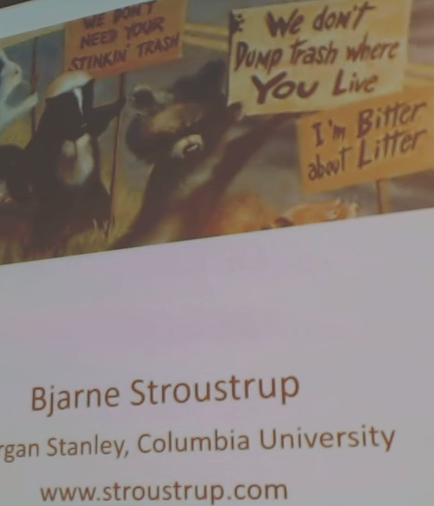C++ on GPUs done right? - Peter Steinbach - Meeting C++ 2015
A new video from Meeting C++ 2015:
C++ on GPUs done right?
by Peter Steinbach
The video:
March 11-13, Online
March 16-18, Madrid, Spain
March 23-28, Croydon, London, UK
March 30, Kortrijk, Belgium
May 4-8, Aspen, CO, USA
May 4-8, Toronto, Canada
June 8 to 13, Brno, Czechia
June 17-20, Folkestone, UK
September 12-18, Aurora, CO, USA
November 6-8, Berlin, Germany
November 16-21, Búzios, Rio De Janeiro, Brazil
By Meeting C++ | Jan 15, 2016 01:20 PM | Tags: libraries intermediate experimental boost advanced
A new video from Meeting C++ 2015:
C++ on GPUs done right?
by Peter Steinbach
The video:
By robwirving | Jan 15, 2016 08:29 AM | Tags: None
Episode 41 of CppCast the only podcast for C++ developers by C++ developers. In this episode Rob and Jason are joined by Mark Logan from Artillery to discuss his experience building a game engine in Javascript and C++!
CppCast Episode 41: Game Development with C++ and Javascript with Mark Logan
by Rob Irving and Jason Turner
About the interviewee:
Mark started learning C++ with Borland Turbo C++ in high school, so that he could build video games. After 20 years, he's finally starting to feel like he knows what he's doing. After graduating from Northeastern University's College of Computer Science, Mark spent 7 years at Google, mainly working on internal infrastructure and automation. More recently, he returned to his first love - game programming - and helped found a studio called Artillery. He's currently the tech lead on Artillery's free-to-play RTS, code-named Atlas. He spends his time working on performance optimization, networking, and solving cross-platform development problems.
By Blog Staff | Jan 14, 2016 12:43 PM | Tags: None

No Littering! (video) (slides)
by Bjarne Stroustrup
By Meeting C++ | Jan 13, 2016 03:25 AM | Tags: intermediate c++14 basics advanced
A new video from Meeting C++ 2015:
Variadic and Variable Templates in C++14
by Peter Sommerlad
By Meeting C++ | Jan 12, 2016 06:40 AM | Tags: performance intermediate advanced
A new video from Meeting C++ 2015
Utilize your CPU power
by Mario Mulansky
By Adrien Hamelin | Jan 11, 2016 08:23 AM | Tags: intermediate c++14
 Nice use of modern C++:
Nice use of modern C++:
Writing modern C++ servers using Wangle
by James Perry
From the article:
I mentioned in my previous post that I was able to build a prototype database engine within one day using Facebook’s Wangle so this post explains how I managed that. By the end of this post, you will be able to write a high-performance C++ server using Wangle. This post also serves as a tutorial which will be merged into Wangle’s README.md.
By Adrien Hamelin | Jan 11, 2016 08:21 AM | Tags: community
The title says all:
Android++ is now open source
From the article:
Android++ is a freely distributed extension and associated MSBuild scripts designed to enable Android application development within Visual Studio. Primarily for NDK based C/C++ applications, it also incorporates customisable deployment, resource management, and integrated Java source compilation.
By Meeting C++ | Jan 11, 2016 07:29 AM | Tags: intermediate c++14 advanced
The first talk is published on youtube from Meeting C++ 2015:
Migration of C++ Libraries to C++14
by Joel Falcou
By Bartosz Bielecki | Jan 11, 2016 07:18 AM | Tags: community c++14 c++11 boost basics
The online compiler Wandbox offers new functionality.
Wandbox
It offers now the following features:
- support for newest (HEAD) versions of GCC and Clang
- support for various versions of Boost (from 1.47 to 1.60)
- support for emacs/vim key bindings
- permalinking your code snippets
By robwirving | Jan 9, 2016 12:59 PM | Tags: None
Episode 40 of CppCast the only podcast for C++ developers by C++ developers. In this episode Rob and Jason are joined by Dr. Greg Law to discuss reverse debugging with Undo Software.
CppCast Episode 40: UndoDB and Live Recorder with Greg Law
by Rob Irving and Jason Turner
About the interviewee:
Dr. Greg Law is co-founder and CEO at Undo Software. He has spent nearly 20 years writing systems-level code, including novel kernel designs and networking architectures in academia and at a variety of start-ups. Greg finds it particularly rewarding to turn innovative software technology into “real” business development. He still gets to write some code, although sadly most of his coding these days is done on aeroplanes. Greg lives in Cambridge, England with his wife and two children.